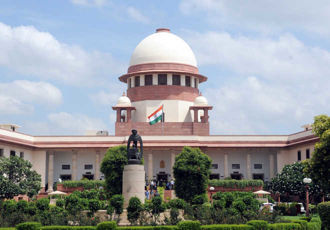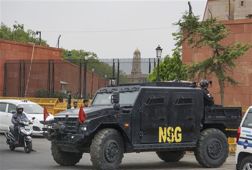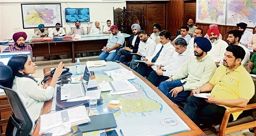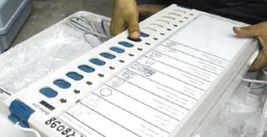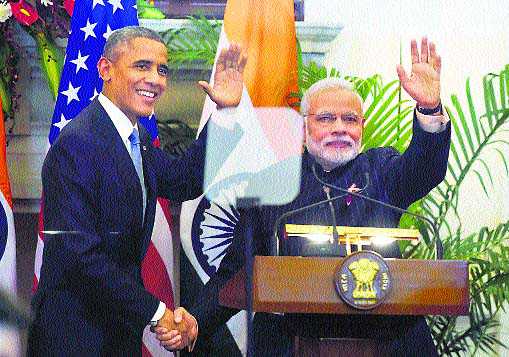
S Nihal Singh
The success of US President Barack Obama’s visit raises a broader question. Is India set for a new, more vigorous pursuit of its foreign policy? It is universally recognised that while governments change, a country’s vital interests do not. Obviously, changing circumstances require policy alterations and fine-tuning.
The Modi government’s attempt to alter the traditional non-aligned policy in tilting towards the United States was already in progress before it assumed power. The nuclear agreement signed with the US was a significant achievement of the Manmohan Singh government, helped by the clear-headedness of President George W. Bush.
One of the many ironies of history is that the leader of the Bharatiya Janata Party, which was vociferous in adding impossible conditions to suppliers of nuclear plants in Parliament, should now be instrumental in untying the knots to remove the roadblocks. Obviously, the successor regime has the decisive majority and strong leadership that was lacking to bring it to fruition.
Almost as important as the signing of the two main agreements on nuclear cooperation and a new 10-year defence agreement was the joint statement put out. It aligned India's position with the United States in spelling out its approach to the Indo-Pacific region, particularly the South China Sea, overriding the tradition Indian hesitation in doing anything that would upset China. New Delhi has now indicated that that it is willing to stand up and be counted.
The new markers Mr Modi is laying down are based on the belief that the US alone can give India the technology and money to help the country become a major economic power in a realistic framework. Russia, the successor state of the Soviet Union, is no longer a super power, although still important for India, particularly as a main supplier of military equipment. Second, a newly assertive China has to be checkmated to protect the country’s interests with help from the only remaining super power.
Another new strand in Mr Modi’s direction in policy-making is the strong relationship he has carved out with Mr Shinzo Abe of Japan, a country as wary of China as India is and its leader is of a similar nationalist bent of mind. A third arrow is the warming friendship with Australia.
This concept is not new. Indeed, it was launched as a quadrilateral arrangement with the United States but nervously given up in the face of strong Chinese objections. Given the new Chinese demonstration of its muscles in the region and beyond, and a more confident Indian government, New Delhi is no longer afraid of being counted. Interestingly, the Indian Foreign Minister, Ms Sushma Swararj, is shortly setting out to visit China and the Prime
Minister will later follow her steps.
Although Mr Modi’s sure-footed step in charting the country's course in foreign policy has been something of a surprise in the nine months of the BJP government, his handling of the Obama visit sets the seal on a more vigorous approach to policy-making. And it is significant that he has chosen to change the Foreign Secretary six months short of retirement with an outstanding officer, Jaishankar, until now Ambassador to Washington, and a main sherpa in building bridges with President Obama.
Giving a new orientation to foreign policy is still a work in progress, but the early moves do add up to building a revamped structure. Mr Modi began with emphasising the neighbourhood and although relations with Pakistan hit a rough patch leading to New Delhi cutting off a round of talks, his priorities are clear. Beyond the neighbourhood are ties with the US, buttressing the Tokyo relationship and ties with South-east Asia and Australia.
Europe seems to have taken a back seat for the present because it is largely tied up with resolving its own problems, passing as it is through a recession and a mid-life crisis in the great and visionary European Union idea, apart from suffering a break with Russia over the crisis in Ukraine. New Delhi has every intention of maintaining its close relationship with Moscow, despite the chill that has descended on Russia’s interactions with the West.
If China has in recent times given up its studied simulation of humility until it achieved the strength it was aiming at, Mr Modi’s moves thus far are indicative of a more activist foreign policy without hiding behind the traditional cloak of non-alignment. There is much speculation of how this will translate into policy towards Pakistan, but a tooth-for-a-tooth approach is already apparent.
Indeed, it seems likely that the Indian foreign policy will hide less behind platitudes and will be more willing to speak its mind. Judging by the harsh Chinese reaction to the outcome of the Obama visit, Beijing is plainly unhappy with new developments. But the Chinese are great pragmatists and will quickly adjust to the new Indian Prime Minister and his team and their different way of doing things.
The bee in the bonnet, as President Obama indirectly reminded Mr Modi in his last public interaction in Delhi before his departure, is the BJP government's skeletons in the cupboard, armies of its supporters wedded to ancient myths and flying the flag of Hindutva in a multi-religious and multi-ethnic country. The so-called reconversions to Hinduism are another spoiler. Mr Modi has failed to evolve a solution for the simple reason that these beliefs are part of the tenets of his mentor, the Rashtriya Swayamsevak Sangh (RSS), the cradle in which he was nurtured.
This dilemma goes beyond logic. As the Prime Minister has publicly stated, he himself believes in the myth that plastic surgery was practised in ancient India and an inference can be drawn that he also believes the other myths so assiduously promoted by the Sangh Parivar. Even if he so believes, will he have the determination to discard, if not repudiate, the beliefs he has grown up in?
In any event, India has entered a new phase in policy-making in the foreign policy field. The country will watch innovations that unfold with anticipation.






















